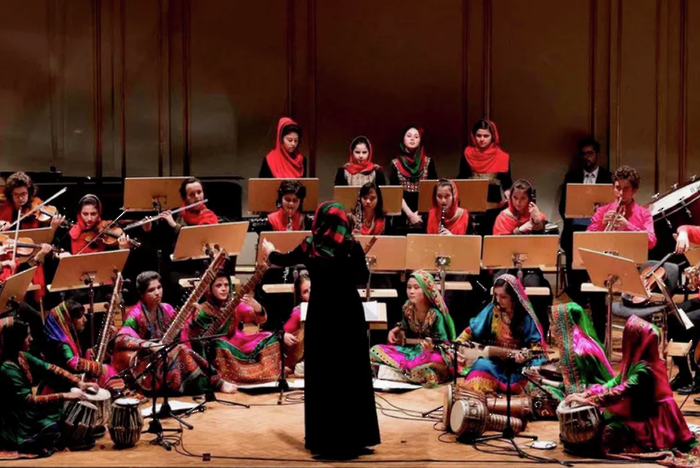Where is music’s #MeToo?
Ellesheva Kissin explores the issue of gender within the music industry

Drake’s surprise single, ‘Nice For What’, has everyone talking about women in music, and, for what seems like the first time, it is in a positive light. The new single’s music video was directed (unusually) by a woman and showcases other powerful women, such as Tiffany Haddish and Letitia Wright. Many have praised the step this takes towards appreciating women’s artistic ability, but it is not enough. Women remain marginalised in the production of music, abused both by the music and the men producing it. The music industry needs a revolution: a reformation like the one that followed the #MeToo campaign.
The campaign against sexual assault has rarely been so dramatised as it was at the Golden Globes. Wearing black, choosing to pose with other women instead of with men, and bringing activists along as dates were all carefully calculated reactions to the newly-publicised Harvey Weinstein scandal. The public’s attention was easily directed to the film industry, with its displays of meticulously choreographed emotion.
Yet the film industry is not alone in hosting this plague; rap mogul Russell Simmons has recently been accused of sexual assault by 14 women, yet such news has failed to filter through the layers of media and into the public mind. The outrage felt in the wake of the Harvey Weinstein saga has not crossed over into the music sector.
“It is clear that in this game, men play with double the amount of chips.”
TMZ reports that filmmaker Jennifer Jarosik, one of the women suing Simmons, was “sick, sore, lame, disabled and disordered” after Simmons allegedly raped her in his home. Yet few people know her story. The story is absent on social media: there is no trending hashtag, no profile picture frames, and no Snapchat news channel lament. It is clear that a few newspaper articles do not always translate directly to public awareness or to collective action.
Icons such as Madonna and John Legend have spoken out about the ingrained sexism in the music industry, yet little attention seems to be paid to these issues. Beyond sensationalist headlines such as those that broadcasted Kesha’s distress to the world, very little concrete aid is offered to victims of sexual abuse. Kesha’s case was lost and she, along with a thousand others, remains trapped.
Madonna in particular made a striking statement when she accepted the Billboard’s Woman of the Year Award in 2016. She told her shocked audience that there are only two rules for girls in the movie business: act pretty and act dumb. The struggle of the female artist was clear: “I stand before you as a doormat - oh, I mean a female entertainer”.
Over a year later, we have artists such as Nicki Minaj venting their rage on Twitter at the fact that women have to work twice as hard to gain half the respect as their male counterparts. Men hold 67.8% of the jobs in the music sector, and according to PRS for Music, only 13% of their 95,000 songwriters are female. It is clear that in this game, men play with double the amount of chips.
Some female artists, however, are changing the game with their music. Female singers want to reclaim their bodies by taking control of their music, just as the recent spate of girl-power movies has attempted to change women’s treatment in film.
Names such as Adele pave the way for strong female singer-songwriters who refuse to sing cheerful kitchy tunes about boys and long to weave complex lyrics. CharliXCX plays with the sexualised status quo by objectifying men in her bubble-gum pop single ‘Boys’, and Lorde’s ‘Green Light’ constructs a proud, drunk girl demanding a new reality. Yet all these hundreds of girl-power tunes still centre, devastatingly routinely, around men’s live and men’s interests.
Against this backdrop, ‘Bodak Yellow’ was received with relief. It is the first solo female rap track to hit No.1 in nearly 20 years, a statistic which speaks for itself. Cardi B raps with a forceful pride, speaking for all the women who want to shout louder, dance aggressively instead of sexily, and lift their middle fingers to those who tell them to act pretty and act dumb. Cardi B’s life doesn’t centre around men; in fact, only one man features in the track, as an unnamed, uncared-for reference to her sex life. “My pussy glitter as gold”, she says; her song revolves around her life, her choices and her sexuality. ‘Bodak Yellow’ is Cardi’s statement against the sexual harassment she too has received, revealed in an interview with Cosmopolitan.
The music industry needs its #MeToo moment. We need to pay attention to the lyrics we mouth and the sexualisation we glorify and not just pathetically thank male artists like Drake for daring to showcase female talent. The sexualisation of women in media and their abuse are two phenomena which are interlinked, and close attention must be paid to both. Women being abused, manipulated and treated as dolls for exploitation and money-making need to be empowered and helped to speak out so that the healing process, painful, divisive and occasionally hypocritical as it is, can begin.
 News / Cambridge climbs to third in world Uni rankings11 October 2025
News / Cambridge climbs to third in world Uni rankings11 October 2025 News / Pro-Palestine protesters stage city centre rally12 October 2025
News / Pro-Palestine protesters stage city centre rally12 October 2025 Film & TV / The curious incident of The Doctor in the TARDIS11 October 2025
Film & TV / The curious incident of The Doctor in the TARDIS11 October 2025 Features / How to spend a Cambridge summer12 October 2025
Features / How to spend a Cambridge summer12 October 2025 News / Tompkins Table 2025: Trinity widens gap on Christ’s19 August 2025
News / Tompkins Table 2025: Trinity widens gap on Christ’s19 August 2025









